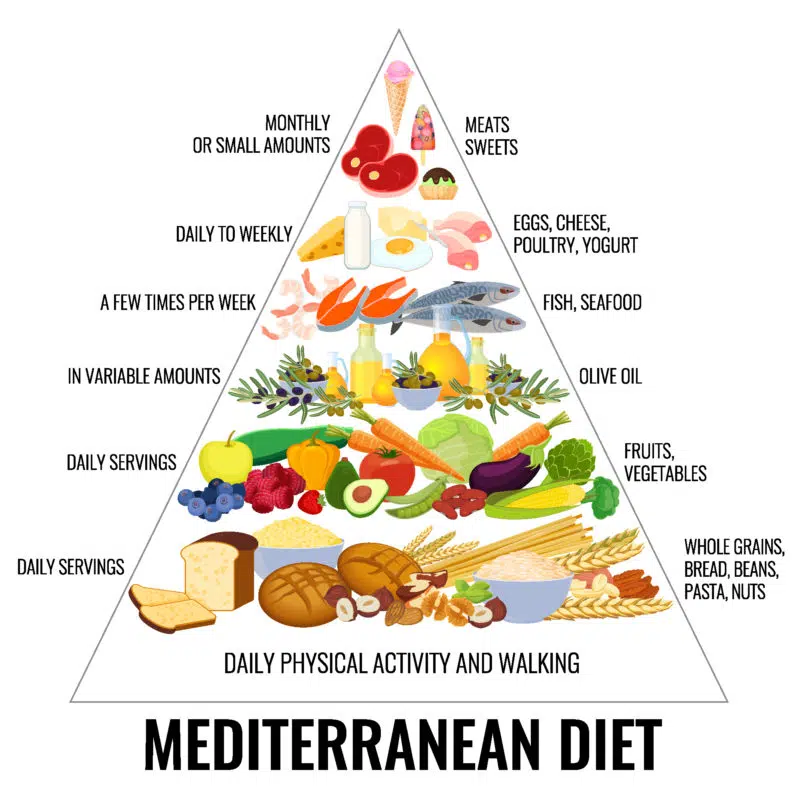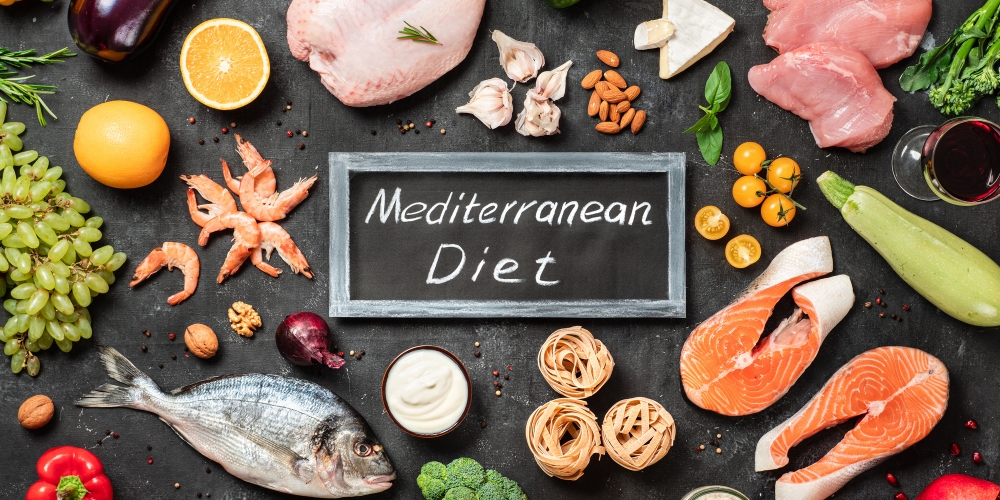What to Eat, What to Avoid, and which Health Benefits? A guide to discover the popular italian diet
The Mediterranean Diet is a heart-healthy style of eating, for italian people is a way of life.
Is characterized by the high consumption of fruits, vegetables, whole grains, legumes, nuts, and seeds, and a moderate consumption of fish, poultry, and dairy products. These foods have been the staples of the Mediterranean diet for centuries and are known for their health-promoting properties.
What is the Mediterranean diet?
Mediterranean Diet is also known for its emphasis on using olive oil as the primary source of fat. Olive oil has been a staple in Mediterranean cuisine for centuries and is rich in monounsaturated fats, which have been shown to have beneficial effects on heart health.
The Mediterranean Diet is also known for its focus on socializing and enjoying meals with family and friends. This aspect of the Mediterranean lifestyle is thought to contribute to its health benefits, as it encourages people to slow down and savor their meals, rather than eating on the go or in front of screens.
Mediterranean Diet origin
The origins of the Mediterranean Diet can be traced back to the early 1960s, when researchers began to observe that the populations living in the Mediterranean region had lower rates of heart disease, cancer, and other chronic diseases compared to other populations.
This led to the development of the Mediterranean Diet Pyramid, which was created to serve as a guide for healthy eating based on the traditional foods of the Mediterranean region.
Definition of Mediterranean Diet
The Mediterranean Diet is a dietary pattern that is based on the traditional foods and cooking methods of the countries surrounding the Mediterranean Sea.
This dietary pattern is characterized by a high intake of fruits, vegetables, whole grains, legumes, nuts, and seeds, and a moderate intake of fish, poultry, and dairy products. It also includes a moderate intake of wine, typically consumed during meals. One of the hallmarks of the Mediterranean Diet is the use of olive oil as the primary source of fat.
The Mediterranean Diet is characterized by the following features:
- High intake of fruits, vegetables, whole grains, legumes, nuts, and seeds
- Moderate intake of fish, poultry, and dairy products
- Use of olive oil as the primary source of fat
- Moderate intake of wine, typically consumed during meals
- Limited intake of red meat, processed meats, and added sugars
- Avoidance of foods high in trans fats
- Limited intake of saturated fats
Mediterranean Diet Benefits and Risks
The Mediterranean Diet is known for its numerous health benefits, including a reduced risk of heart disease, stroke, type 2 diabetes, and certain types of cancer. This is due to the fact that the Mediterranean Diet is high in antioxidants, anti-inflammatory compounds, and monounsaturated fats, which have been shown to have protective effects on health. Additionally, the Mediterranean Diet is also associated with a lower risk of cognitive decline and a lower risk of depression.
As for what to eat, the Mediterranean Diet emphasizes the consumption of whole, unprocessed foods, such as fresh fruits and vegetables, whole grains, legumes, nuts, and seeds, as well as fish and seafood, poultry, and dairy products. The diet also includes moderate amounts of red wine, which is typically consumed during meals.
What to avoid? it is recommended to limit the intake of red meat, processed meats, and added sugars. It is also important to limit the intake of saturated fats, such as those found in butter and cream, and to avoid foods that are high in trans fats, such as fried foods and baked goods.
It is important to note that the Mediterranean Diet is not a specific diet plan or a restrictive diet, but rather it is a way of eating and a lifestyle that emphasizes the consumption of whole, unprocessed foods, and the enjoyment of meals with family and friends. It can be easily adapted to individual preferences, cultural and personal circumstances.
As for potential risks, the Mediterranean Diet, like any diet, if not well balanced or if not followed in the right way, could lead to deficiencies in some nutrients, and in some cases, it could be high in sodium if not controlled properly. Also, it is important to note that alcohol should be consumed in moderation, as excessive alcohol intake can increase the risk of certain health problems.
The Mediterranean Diet Pyramid
Mediterranean Diet Pyramid is a visual representation of the Mediterranean Diet and serves as a guide for healthy eating based on the traditional foods of the Mediterranean region. The pyramid was developed by Oldways, a non-profit organization, in collaboration with the Harvard School of Public Health and the World Health Organization.
The pyramid is divided into six levels, with the foundation of the pyramid being made up of the foods that should be consumed most frequently, and the top of the pyramid being made up of the foods that should be consumed less frequently.

The Mediterranean Diet Pyramid
First level, the base of the pyramid is made up of fruits, vegetables, whole grains, legumes, and nuts. These foods should make up the bulk of the diet and should be consumed in the greatest quantity. Are rich in antioxidants, anti-inflammatory compounds, and other beneficial nutrients that have been shown to promote health and reduce the risk of chronic diseases.
Next level of the pyramid is made up of fish, poultry, and eggs. These foods should be consumed in moderate amounts, and they provide important nutrients such as omega-3 fatty acids, protein, and vitamins.
Third level of the pyramid is made up of dairy products such as cheese and yogurt. They should also be consumed in moderate amounts, and they provide important nutrients such as calcium, phosphorus, and vitamin D.
The fourth level of the pyramid is made up of red meat and sweets. These foods should be consumed in small amounts, and they are high in saturated fat and added sugars, which can increase the risk of chronic diseases if consumed in excess.
Fifth level of the pyramid is made up of fats and oils, specifically olive oil, which is the primary source of fat in the Mediterranean Diet. It should be used in moderate amounts to prepare foods and dressings.
The top of the pyramid is made up of physical activity. Regular physical activity is an important part of the Mediterranean lifestyle and is essential for maintaining good health.
Mediterranean Diet food list
A Mediterranean Diet food list includes a wide variety of foods that are typically consumed in the countries surrounding the Mediterranean Sea. This dietary pattern is characterized by a high intake of fruits, vegetables, whole grains, legumes, nuts, and seeds, and a moderate intake of fish, poultry, and dairy products. It also includes a moderate intake of wine, typically consumed during meals.
One of the hallmarks of the Mediterranean Diet is the use of olive oil as the primary source of fat.
Here is a list of foods that are typically included in a Mediterranean Diet:
- Fruits: Apples, oranges, lemons, limes, grapes, figs, dates, apricots, peaches, plums, pears, berries, and melons.
- Vegetables: Tomatoes, cucumbers, bell peppers, eggplant, zucchini, onions, garlic, carrots, celery, spinach, kale, collard greens, and Swiss chard.
- Whole Grains: Whole wheat bread, barley, bulgur, oats, quinoa, farro, and brown rice.
- Legumes: Chickpeas, lentils, beans, and peas.
- Nuts and Seeds: Almonds, walnuts, hazelnuts, pistachios, pumpkin seeds, sunflower seeds, and sesame seeds.
- Fish: Salmon, tuna, cod, halibut, sardines, anchovies, and shellfish.
- Poultry: Chicken and turkey.
- Dairy Products: Milk, yogurt, and cheese.
- Wine: Red wine, typically consumed in moderation during meals.
- Olive Oil: Used as the primary source of fat.
- Herbs and Spices: Oregano, thyme, basil, rosemary, dill, parsley, and cumin.
It’s important to note that the Mediterranean Diet and Mediterranean Diet Pyramid iare not a strict diet plan or a restrictive diet, and it can be easily adapted to individual preferences, cultural and personal circumstances. Also, are not a one-size-fits-all approach and that people with certain health conditions or dietary needs may need to make modifications to the diet, such as increasing the intake of certain foods or limiting the intake of others. It’s always best to consult with a healthcare professional or a registered dietitian before making any significant changes to your diet.
5 Mediterranean diet recipes
Here are 5 Mediterranean Diet recipes that are delicious and easy to prepare:
-
Mediterranean Quinoa Salad:
- Cook 1 cup of quinoa according to package instructions
- In a separate pan, sauté 1 diced bell pepper, 1 diced red onion, and 1 minced garlic clove in 1 tablespoon of olive oil until softened.
- Add 1 can of drained and rinsed chickpeas, 1/4 cup of crumbled feta cheese, and 1/4 cup of chopped fresh parsley to the pan.
- Toss the quinoa with the vegetable mixture and dress with the juice of 1 lemon and 1 tablespoon of olive oil.
- Serve chilled or at room temperature.
-
Grilled Salmon with Lemon and Herb:
- In a small bowl mix together 2 tablespoons of olive oil, the juice of 1 lemon, 2 cloves of minced garlic, 1 teaspoon of chopped fresh rosemary and thyme, salt and pepper.
- Place 4 salmon fillets in a baking dish and pour the marinade over the fish.
- Let it marinate for at least 30 minutes in the refrigerator.
- Grill the salmon for about 6 minutes per side, or until cooked through.
-
Greek Yogurt Chicken:
- Mix together 1 cup of Greek yogurt, the juice of 1 lemon, 2 cloves of minced garlic, 1 teaspoon of dried oregano, and 1/4 teaspoon of salt.
- Place 4 boneless, skinless chicken breasts in a baking dish and pour the yogurt mixture over the chicken.
- Bake at 375F for 25-30 minutes, or until the chicken is cooked through.
-
Mediterranean Vegetable and Bean Soup:
- In a large pot, sauté 1 diced onion, 1 diced carrot, 1 diced celery, and 2 cloves of minced garlic in 1 tablespoon of olive oil until softened.
- Add 1 can of diced tomatoes, 6 cups of vegetable broth, 1 can of drained and rinsed cannellini beans, and 1 cup of chopped mixed vegetables (such as zucchini, bell pepper, and eggplant)
- Bring the soup to a boil and then reduce the heat and let it simmer for 20 minutes.
- Season with salt and pepper to taste and serve with a sprinkle of grated Parmesan cheese and a drizzle of olive oil.
-
Spinach and Feta Stuffed Chicken Breast:
- Preheat the oven to 375F.
- In a small skillet, sauté 1 diced onion and 2 cloves of minced garlic in 1 tablespoon of olive oil until softened.
- Add 1 cup of chopped spinach and cook until wilted.
- Remove from heat and stir in 1/4 cup of crumbled feta cheese.
- Cut a pocket into the side of 4 boneless, skinless chicken breasts and stuff with the spinach and feta mixture.
- Place the chicken in a baking dish and bake for 25-30 minutes, or until the chicken is cooked through.
All of these recipes are delicious, healthy, and easy to make, and they all follow the Mediterranean Diet principles, which emphasizes the consumption of whole, unprocessed foods. Enjoy!
